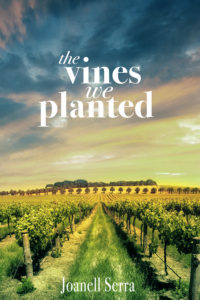
When you cross the wide intersection of Broadway, Grant and Columbus Street in the North Beach area of San Francisco, books fly above your head, like birds taking flight. Pale white, strung on wire, one can picture each book carrying its stories to the far ends of the world. I like to hover beneath them for a minute and send The Vines We Planted up with them mentally, sailing above the clouds to readers. Maybe one reader sits on her front porch in Wichita, one rides the underground in London, another peruses the library stacks in Miami, or reads over lunch in San Salvador, or India.
My novel has made it to all these places – I’ve had a text or email or photo from each. It’s difficult to describe what it feels like to get a message in broken English, from a time zone ten hours ahead, saying how much the book meant to someone. The stunning thrill of that – a stranger, far away, being touched by the pain of Uriel Macon – is beyond my dreams and hopes as a writer.
Last night I “visited” with a book club on FaceTime. This week I will speak to a group on a telecast for the Las Comadres Latino Book Club (August 27, 8:00 PM Eastern) and Joseph Carrabis will share an audio cast of an interview we did over the summer.
Perhaps most importantly, I’ll turn my first draft of book two over to my editors for the first round of slice and dice. (Luckily they are lovely.)
I’m also sending a book to special place: prison.
The rights of prisoners has long been something, like many issues in the current climate, that I think about, worry about, and yet do nothing about. But when I read a recent article about how hard it is to get books to prisoners, it occurred to me this was something I could do.

So, my book will be dropped off at the Prisoners’ Literature Project, with a donation to get it to the place they see fit. If it works, I’ll send a few more. Maybe I’ll even show up on a Wednesday, their weekly volunteer day in Berkeley, and pack up some books (I have experience for this position.)
I tweeted and posted a few weeks ago about a new shift in the prison system towards more privatization. The policy forces families to pay high amounts to send in a birthday card let alone a book, has prisoners tablets as the only reading device prisoners allowed and making it expensive to do so. It’s a horrible shift, moving one step closer to a world controlled by a few corporations, and prisons being big business.
Additionally, some prisons have limited the books accessible to prisoners, despite evidence that reading reduces recidivism, even banning a book that examines our present justice system. The New Jim Crow: Mass Incarceration in the Age of Color Blindess by Michelle Alexander.
This brings to mind a quote from Nelson Mandela that both inspires and frightens me.
“It is said that no one truly knows a nation until one has been inside its jails. A nation should not be judged by how it treats its highest citizens, but its lowest ones.”
If we look inside our prison system, both who is being sent there and how we are treating inmates, I believe we will be judged harshly.
So today. I’m sending a book inside instead of setting it free to roam the world. Because for people locked up, a book can take them away, at least for a little while. Maybe this reader can visit with thhorses, follow my characters through the vineyard and hold someone’s hand. Maybe it will lead to a day passing more quickly, an extra drop of determination to survive, feed a dream to walk outside in beauty, and breathe deeply. I hope it feels to them as they receive this book, or any book, that someone, somewhere, is kind.
